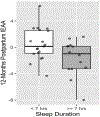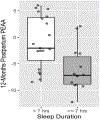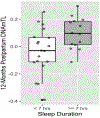Postpartum sleep loss and accelerated epigenetic aging
- PMID: 33903077
- PMCID: PMC10027398
- DOI: 10.1016/j.sleh.2021.02.002
Postpartum sleep loss and accelerated epigenetic aging
Abstract
Background: Insufficient sleep has been linked to accelerated biological aging in adults, providing a possible mechanism through which sleep may influence disease risk. In the current paper, we test the hypothesis that short sleep in postpartum would predict older biological age in women one year post birth, as indicated by accelerated epigenetic aging.
Methods: As part of a larger study of pregnancy and postpartum health (Healthy Babies Before Birth, HB3), 33 mothers provided blood samples for epigenetic aging clock estimates. intrinsic epigenetic age acceleration (IEAA), extrinsic apigenetic age acceleration, phenotypic epigenetic age acceleration (PEAA), GrimAge, DNAmPAI-1, and DNAm telomere length (TL) were calculated using established protocols. Sleep duration was categorized as insufficient sleep (<7 hours per night) or healthy sleep duration (7+ hours per night). Sleep quality was determined using the Pittsburgh Sleep Quality Index (Global score >5).
Results: Maternal postpartum sleep duration at 6 months, but not 12 months, following a birth was predictive of older 12-month IEAA, B (SE) = 3.0 (1.2), P = .02, PEAA, B (SE) = 7.3 (2.0), P = .002, and DNAmTL, B (SE) = -0.18 (0.07), P = .01, but not other indices, all P> .127. Self-reported poor sleep quality at 6 and 12 months was not significantly related to epigenetic age.
Conclusions: These findings suggest that insufficient sleep duration during the early postpartum period is associated with accelerated biological aging. As the sample size is small, additional research is warranted with a larger sample size to replicate these findings.
Keywords: Aging; Epigenetic; Postpartum; Sleep; Women.
Copyright © 2021 National Sleep Foundation. Published by Elsevier Inc. All rights reserved.
Figures



References
Publication types
MeSH terms
Grants and funding
LinkOut - more resources
Full Text Sources
Medical
Research Materials

